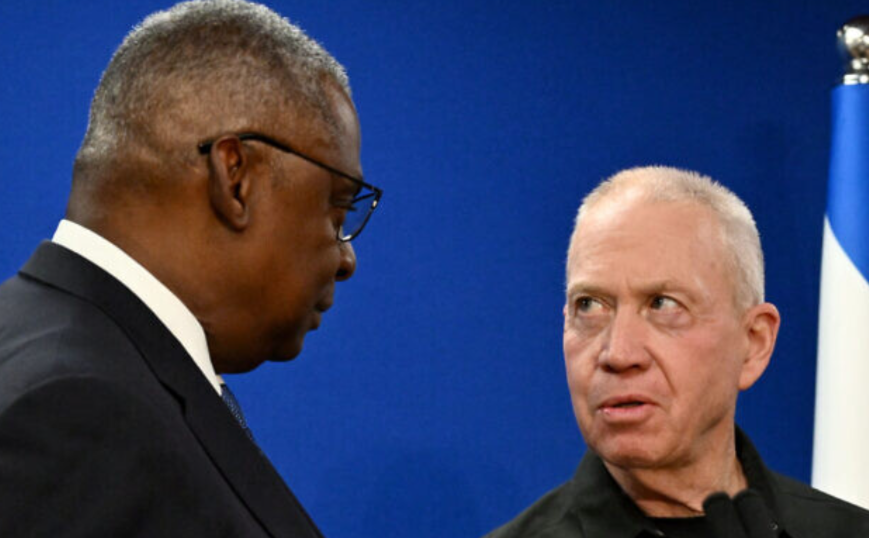Austin and Gallant discuss tensions, Pentagon silent on Lebanon attack
Pentagon spokesman Major General Pat Ryder told journalists that Austin spoke with Gallant regarding "tensions in the Middle East and the threats facing Israel."
-

US Defense Secretary Lloyd Austin and Israeli Security Minister Yoav Gallant give a joint press conference in Tel Aviv on December 18, 2023. (AFP)
US Secretary of Defense Lloyd Austin and Israeli Security Minister Yoav Gallant held a phone conversation on Tuesday in which they claimed they wished to reduce tensions in the region.
The call comes after the Islamic Resistance in Lebanon - Hezbollah held the Israeli occupation fully responsible for the aggression caused by the attack after obtaining results of its probe, as well as examining available data, regarding the pager detonations earlier today.
Lebanon's health minister also announced that eight individuals were killed and 2750 were injured, 200 of whom are in critical condition, across 100 hospitals.
The Pentagon refused to divulge whether the two spoke about the attack.
Pentagon spokesman Major General Pat Ryder told journalists that Austin spoke with Gallant regarding "tensions in the Middle East and the threats facing Israel," explaining that the US defense secretary reiterated the need for a captive agreement and a ceasefire in addition to "reducing tensions through diplomacy to prevent the potential for a wider regional conflict."
Key Israeli businesses warn Netanyahu against dismissing Gallant
In a similar context, the Israeli Business Forum has called on Israeli Prime Minister Benjamin Netanyahu not to dismiss Gallant and replace him with Gideon Sa’ar, Israeli media reported on Tuesday.
In a statement, the forum, which includes 200 leading companies in "Israel" and represents most workers in the private sector, warned that "firing [Gallant] would weaken Israel in the eyes of its enemies and further deepen public division."
The statement added, "The Prime Minister knows better than anyone that all economic indicators show Israel is heading toward an economic abyss and sinking into a deep recession. The last thing Israel needs right now is the dismissal of a [security] minister, which would destabilize the [entity]."
Similarly, Knesset member and former Chief of General Staff Gadi Eizenkot said in a radio interview that, while he is "no fan" of Gallant, his dismissal was prepared for political purposes to pass the [Haredi] draft law, thus harming the Israeli military."
Eizenkot pointed out that this decision is "a continuation of Netanyahu's cynical policies, where personal political interests take precedence, while none of the war’s objectives have been achieved after a year of its start."
Israeli media reported on that Monday Netanyahu is seeking to dismiss his security minister, citing Gallant's "obstruction of expanding the attack on Lebanon," and that Knesset member Gideon Sa'ar "will replace him within an hour."
Israeli media said on Tuesday that the main issue now is an attack in Lebanon "that could lead to a war safe return" of northern settlers to their residences as a fourth goal, Israeli media reported on Tuesday.
The Israeli occupation entity "will continue to act to achieve this goal,” the statement said, triggering a series of official reactions to the potential that this means launching a war on Lebanon.
The other goals remain: bringing back the captives, "dismantling the military and governing" capabilities of Palestinian Resistance movement Hamas, and "ensuring Gaza will no local pose a threat to Israel" in the future. So far, none of these objectives have been achieved, with an increasing number of officials doubting their feasibility.
Directly following the start of the ongoing Israeli war on Gaza, Hezbollah launched its support front in southern Lebanon, conducting daily operations against Israeli military bases, forces, and settlements.
Hezbollah's attacks forced tens of thousands of Israelis to flee northern settlements, creating a de facto "security belt" inside occupied Palestine.
Meanwhile, settlers have accused the Israeli government of "abandoning the North" following the occupation army's failure to halt Resistance operations. Tensions have escalated between Tel Aviv and the mayors of northern settlements, leading several mayors to announce they are "cutting ties" with both the government and the military.

 4 Min Read
4 Min Read








